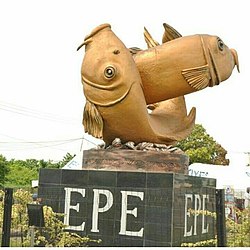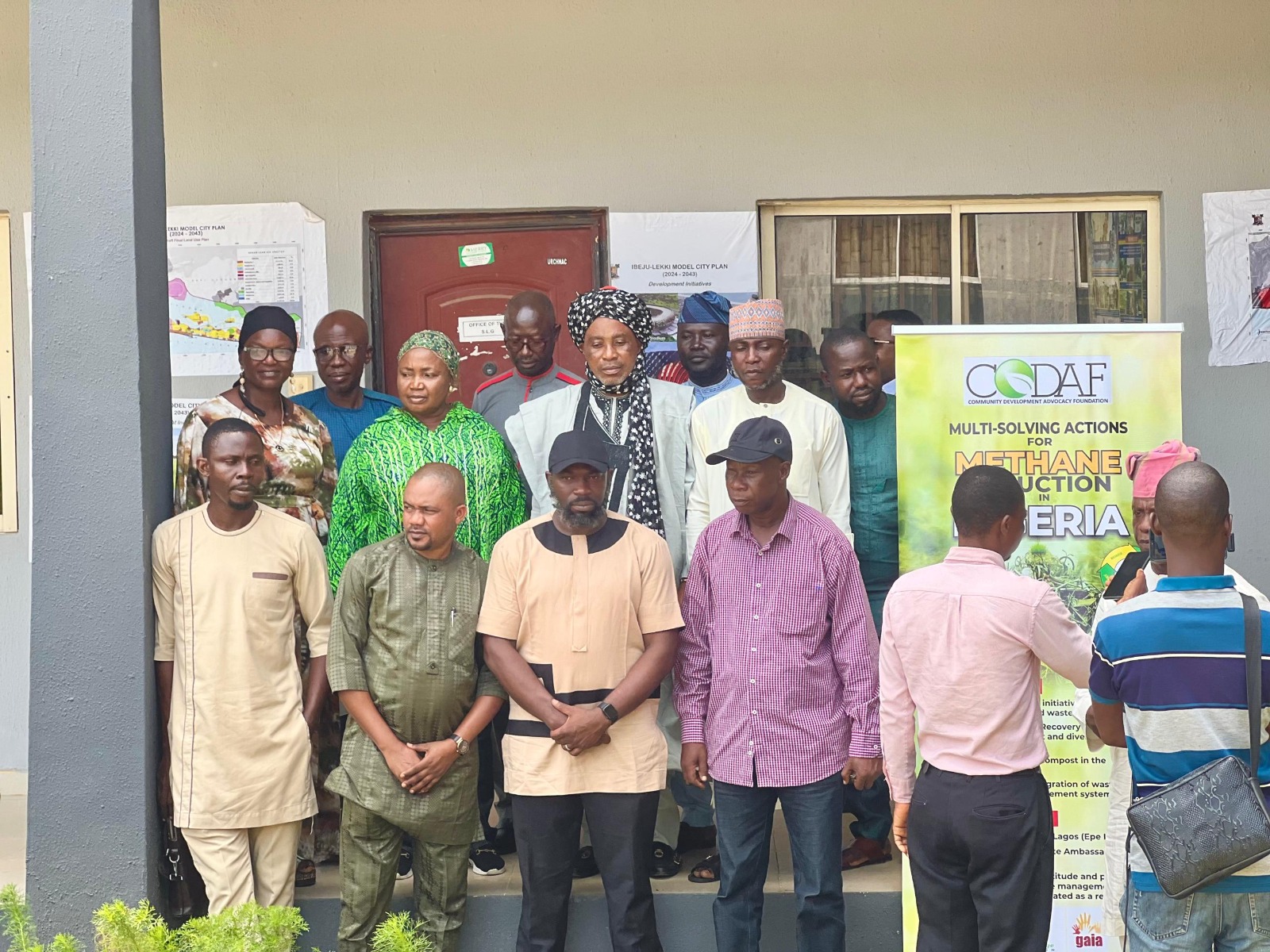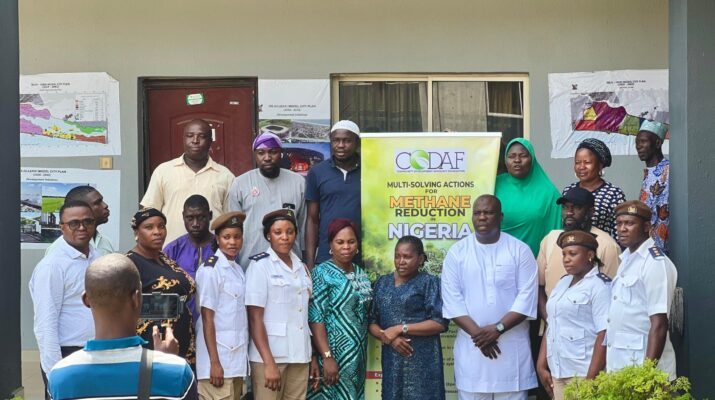In an effort to achieve a sustainable environment and mitigate the impact of climate change, the Community Development Advocacy Foundation (CODAF) and a member of the Global Alliance for Incinerator Alternatives (GAIA) has unveiled a baseline report on Multi-Solving Actions for Methane Reduction in Nigeria (MAMRN) which has culminated in the building of a Waste Materials Recovery facility in Epe with a view to encouraging the residents to embrace green agricultural practices
By Edu Abade
A group of environmental activists and climate action crusaders have canvassed drastic reduction of methane emissions to effectively tackle the environmental, waste management and public health issues emanating from poor handling of wastes in Nigeria especially in Lagos, the country’s commercial nerve centre.
 In that regard, residents of Epe Community in Lagos State, comprising local government officials, households, farmers, waste pickers and market officials have expressed delight at the methane reduction project that has culminated in the construction of a Waste Materials Recovery facility in Epe.
In that regard, residents of Epe Community in Lagos State, comprising local government officials, households, farmers, waste pickers and market officials have expressed delight at the methane reduction project that has culminated in the construction of a Waste Materials Recovery facility in Epe.
The project was unveiled at the presentation of a baseline report on Multi-Solving Actions for Methane Reduction in Nigeria (MAMRN) by the Community Development Advocacy Foundation (CODAF), a member of the Global Alliance for Incinerator Alternatives (GAIA) at the Epe Council Headquarters.
Chairman of the Council, Princess Surah Animashaun, who was represented by the Vice Chairman, Hon. Sikiru Adeniyi Owolomose, commended the CODAF team comprising its Executive Director, Richard Benin, Programme Manager, Environment, Melody Enyinnaya, Onyeka Venath and Jeru Ubrei-Maimoni for the initiative in the area.
He said: “Waste to wealth initiative remains crucial for a better environment and sustainable future and as such, organisations, institutions, groups, communities and individuals should be encouraged to embark on projects targeted at gathering wastes (including plastics) for recycling, which will improve the environment.”
Speaking, Benin stressed the importance of green and sustainable agricultural practices, adding that Epe was chosen for the MAMRN project due to its high methane generation activities as an agricultural and fishing hub in Lagos State.
Also speaking, Senior Programme Officer with Sustainable Research and Action for Environmental Development (SRADev Nigeria), Victor Fabunmi, stressed the need for sustainable waste management through awareness creation and education in transforming wastes to resources, adding that implementation of such programmes were ongoing in Lagos, Jos, Edo, Abuja and other parts of the country where waste management has become a challenge.
On her part, Enyinnaya, who presented the objectives, activities and expected outcomes of the project, explained that the project addresses one of the most potent, yet under-addressed greenhouse gas emissions affecting the climate system.
“The project takes a holistic approach by targeting methane emission in the waste sector while simultaneously creating co-benefits for local communities and their ecosystems just as it intends to train farmers on the use of non-petroleum based chemicals in their farming activities,” she stated.
Objectives of the project are to promote zero waste initiatives and awareness leading to methane and waste reduction; establish a Material Recovery Facility to enhance the waste management and diversion of waste from dumpsites and landfills and mobilise community action against waste to energy projects.
Others are to promote the use of compost in the agricultural sector; advocate the integration of waste pickers into the formal waste management system in Nigeria and increase the recovery rate of recyclable and compost materials by a reasonable percentage.
She listed the project activities to include community consultations; stakeholders’ mapping and baseline survey; creation of zero waste ambassadors; building of a Material Recovery Facility (MRF); My Zero Waste Farm Project (MZWFP); creation of Zero Waste Farmers Network and establishment of Waste Parliament in Lagos.

Other activities are the Expanded Waste Parliament (EWaP); policy and media advocacy; Zero Waste Market Campaign; Waste Pickers Organizing; My Zero Waste City Radio Jingle; MAMRN Experience Sharing Webinar, as well as monitoring and evaluation.
Enyinnaya emphasised that the project, for which CODAF has already spent over N20 million, will significantly reduce methane emissions in the waste sector thereby improving air quality and public health in the community, while the construction and operation of the MRF will create thousands of green jobs and promote waste sorting, reusing, recycling and composting.
The project will also remarkably improve the agricultural sector and further empower farmers on the use of compost for an increased crop yield just as residents will benefit from training programs on zero waste.
On the expected outcomes, she said: “A fully operational MRF in Epe will recover 2.3 tons of plastics and other non-biodegradable waste per week and treat 2.7 tons of organic waste per week (using composting and black soldier fly technology).
“It will establish a Zero Waste Ambassadors campaign (in Lagos) in collaboration with other GAIA members in Nigeria; an active Zero Waste Farmers Network, as well as a cleaner and healthier environment. It will engender improved knowledge, attitude and practices of Lagos residents towards waste management, where waste is reduced and treated as a resource due to the Zero Waste Ambassadors Project.”
In his presentation, Chief Research Officer and Senior Lecturer, National Centre for Energy and Environment, Energy Commission of Nigeria (ECN), University of Benin, Dr. Chukwudi Nnaemeka Emeribe, explained that the survey targeted households, farmers, waste pickers, market and local government officials, adding that the team visited waste and landfill sites, composting facilities and examined existing waste management policies.
“Our purpose was to quantify waste practices and attitudes towards organic composting, analyse policy gaps and institutional barriers to waste management, as well as understand the cultural and socio-economic factors affecting adoption and access to infrastructure. We also evaluated waste diversion capacity, identified policy strengths and gaps in methane reduction efforts with a view to establishing a scientific benchmark for emissions.”
He said most of the targeted groups expressed the willingness and readiness to adopt and explore the green alternative in their agricultural practices to engender a sustainable ecology and brighter future.
Executive summary of the report reveals that Lagos State produces around 13,000 to 15,000 metric tons of solid waste daily, but only about 40 percent of that a fraction of wastes are collected efficiently, which leaves a large amount of waste piling up in open dumpsites across the state.
CODAF maintained that the unmanaged waste piles lead to serious environmental issues, such as methane emissions, air pollution and a higher risk of flooding, all of which worsen the effects of climate change in Lagos and across the country, while key findings revealed that the most significant impact of climate change in Lagos include coastal inundation, increased flooding, increased incidences of pests and diseases and damage to building infrastructure.
“Open Municipal Solid Waste (MSW) dumpsites and poor handling of wastes will exacerbate the impacts due to the activities of storm water runoff which will dislodge dumpsites hence intensify pollution of water bodies and spread of diseases in Lagos State.
“Organic waste makes up the largest portion of MSW in Epe, representing 31.3 percent (food leftovers like fruits, vegetables, meat, bones and dairy products), with plastics and rubber falling at 21.3 percent. Most farmers and households dispose of their organic wastes indiscriminately, which leads to material loss and missed chances for composting.
“Using the IPCC Zero Order Decay Model (ZODM), estimated methane potential from household and market waste in Epe, Lagos state was 5,669 tons. To arrive at this value, the population of Epe was projected to 645,432.03 in 2025 using annual population growth rate of 3.70 percent for Lagos,” the study further showed.
It estimated that about 64 percent of household wastes comprise decomposable items like fruits, vegetables and food scraps, pointing to a significant opportunity for diverting organic waste, adding that farmers generally have a better understanding of composting, while only about 52 percent have a fair knowledge of the use of compost manure, but are not currently engaged in the process due to lack the necessary training and infrastructure.
While 80 percent of farmers are keen on using compost manure, just 46.2 percent really grasp the composting process, which shows there’s a clear need for more training and support. Market vendors are also struggling with sustainable waste management.
The report also revealed that about 54.2 percent of market wastes mostly end up in open areas, and only 29.1 percent of vendors know about composting practices, adding: “On a positive note, 78.8 percent of them are open to participating in source separation and composting with the right facilities and training.
“Currently, waste pickers focus on plastics (37.5 percent) and metals (31.3 percent), but they aren’t formally integrated into the waste management system, which hampers both efficiency and safety. Moreover, only 43.75 percent of wastes are sorted correctly, highlighting the urgent need for better sorting practices through training and improved infrastructure.
“Key indicators set ambitious goals for the project, including ramping up composting rates from 12.5 percent to 80 percent, diverting five tons of waste from landfills each week, and cut methane emissions by 30 percent. The project aims to boost community awareness on Zero Waste practices from 68 percent to 75 percent and it is targeting 100 percent adoption of compost manure among farmers.
“The results also highlight that improving waste management in Epe requires a united effort involving infrastructure upgrades, community-led projects, policy support and on-going oversight. If the strategies from the MAMRN initiative are put into action, Lagos State has the opportunity to set a benchmark for sustainable waste management, cut down on methane emissions and boost the community’s ability to adapt to climate change,” the report stated.




